Comics and social relevance
The blog Sadly, No! wrote
a piece that treated comics and their readers in a very snide and
contemptuous manner ("...if you bought comics once you were older than
fourteen...") and generally takes the view that if comics aren't
relevant to our regular lives, then what's the point? (I generally like
this blog, but this particular piece is pretty annoying.) The
right-wing piece that it discusses generally talks about a lot of
comics that I was aware of at the time, but didn't read, (The
Illuminati was one that he mentions and that I did read and yes, I followed a lot
of the Marvel Civil War
stories) so I generally don't really buy the idea that comics have a
real leftward tilt to them.
Can and/or should comics be socially/politically relevant?
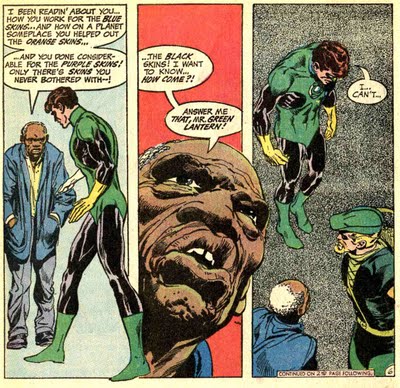
The Green
Lanter/Green
Arrow stories of 1970 were certainly very deliberate
in taking that tack.
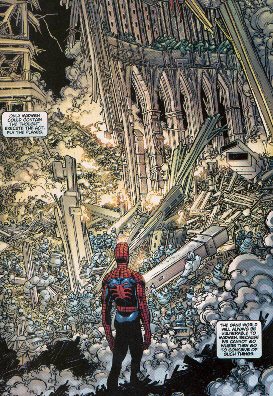
The authors of Spider-Man didn't feel they had any choice but to put 9-11
into a Spider-Man comic. Superman had Metropolis and Batman had Gothem
City (Both of which were understood to symbolically represent New York
City), but Spider-Man actually lived
in New York City and couldn't ignore an event that so directly
impacted his home town. That doesn't mean he could affect the event, as
we see in the picture above, Spider-Man arrives on the scene long after
the damage was done.
Are there other well-known examples of comics being socially relevant?
There are a few, but being relevant hasn't been a particularly popular
or
long-lived phenomenon.
As to why that might be, the playwright Bertolt Brecht wrote some very
good plays concerning truth, power and authority. I saw "Life
of
Galileo" in the late 1970s in Washington DC and the high school
I worked at in the 1980s produced "Mother Courage and Her
Children"
as their senior play one year. These plays both make very general
statements as opposed to being about specific political issues. Brecht
did inded produce plays about specific, local issues, but these plays
are generally forgotten and are hard to find. I believe comics writers
generally are more motivated to produce works that will be relevant and
remembered years and years from the time they're written and less
motivated to write specific polemics that will quickly become
irrelevant and forgotten.
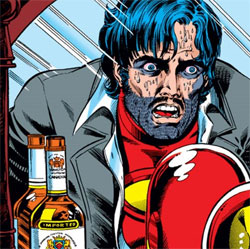
Iron Man did two extensive storylines that involved his alcoholism in
1979 and in the early 1980s, but even though Iron
Man/Tony Stark dealt
with an evil corporation, I'm not sure that these really count as
socially or politically relevant in the same way that the two above
storylines did. They focused very specifically on how one particular
person deals with a personal, though widespread, problem.
I think one of the most sensible statements I've seen on the
issue of how relevant comics are to social issues was in X-Men 122 in
1979.
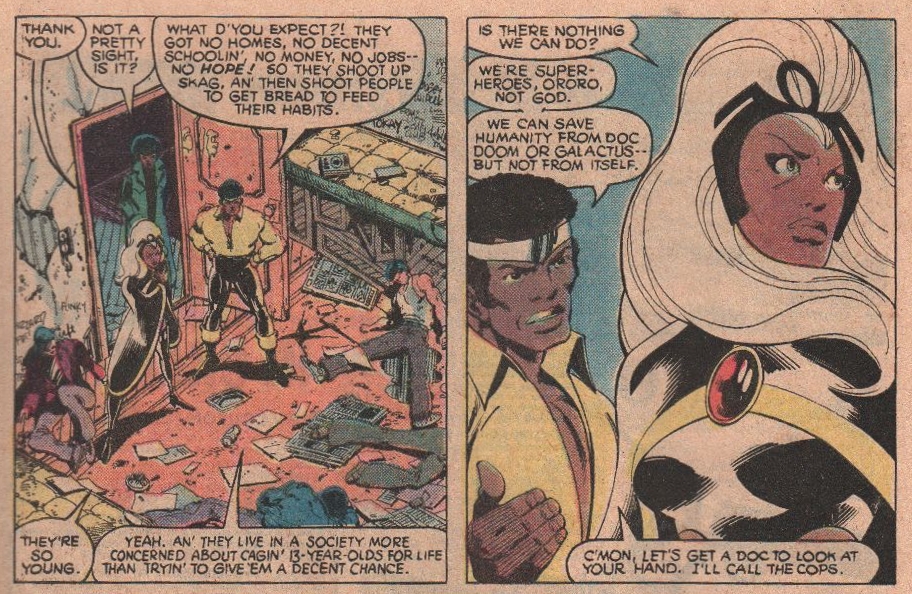
Essentially, Luke Cage agrees with my view that superheroes are like
nuclear weapons. Nukes are really good for deterring other nations from
using nukes, but not much else. Superheroes are really effective against
supervillains, but even if they were real, they're not of much
day-to-day, actual, practical use to society.
A commenter to the Sadly, No!
piece quotes
a
piece on comics:
But as as a genre, the superhero is
very conservative indeed. Though this can be interpreted in different
ways. They stop bank robbers or other super villains dressed in a
similar fashion, they don’t try to alter the causes, create a world
where people don’t want to be bank robbers or super villains.
Proponents of law and order, but not part of big government, they
emphasise individual responsibility over statism, in keeping the world
as it is, simply dealing with the side effects of that. In a universe
where the Fantastic Four can create portals into other dimensions,
robots and all manner of otherworldy devices to beat the bad guys, they
don’t eliminate poverty, they don’t create free, environmentally
friendly energy. Any attempt by someone to do such a thing, and solve
real world problems such as people losing limbs [?], has their laudable
aim backfire on them and they become a super villain like the Lizard.
But why?
I completely agree with the effects that the author notes. Probably the
best example lately of a superhero taking on social and political
issues was Doctor Fate 25 to 41, starting in 1980. Kent Nelson was
replaced as Doctor Fate by his wife Inza. Their house is moved to a
poor neighborhood and Inza is asked if she can do anything about a
malfunctioning traffic light.
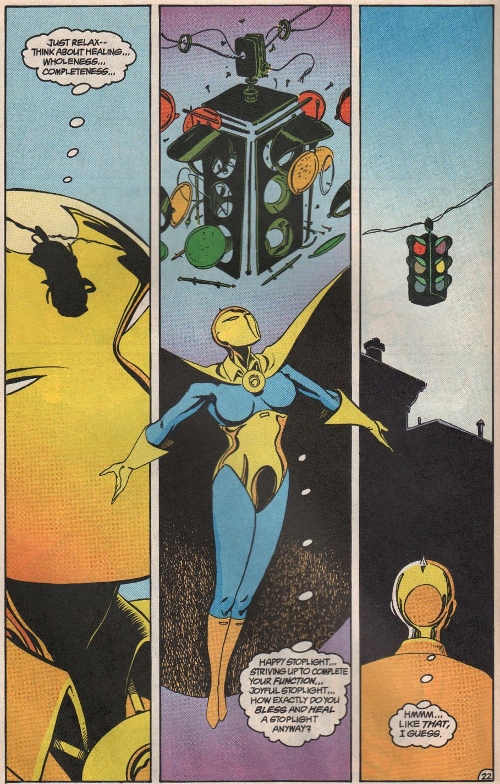
Turns out she can and she fixes many other things as well. Doctor Fate
very consciously and deliberately takes a conservative
approach to the issues of the day even though the authors are clearly
liberals. She creatsd a zone where
her "globes of power" fly around and solve problems for citizens. A
cab-driver asks them to give him a new car, the globe doesn't agree to
do that, but cleans up his cab and fixes it up so that it runs like
new. This solves the needs and desires of citizens, but doesn't disrupt
the social order at all as no one gets anything fancier than what he
had to start with.
Eventually though, she comes to the attention of politicians in the
Capitol and she has to testify.
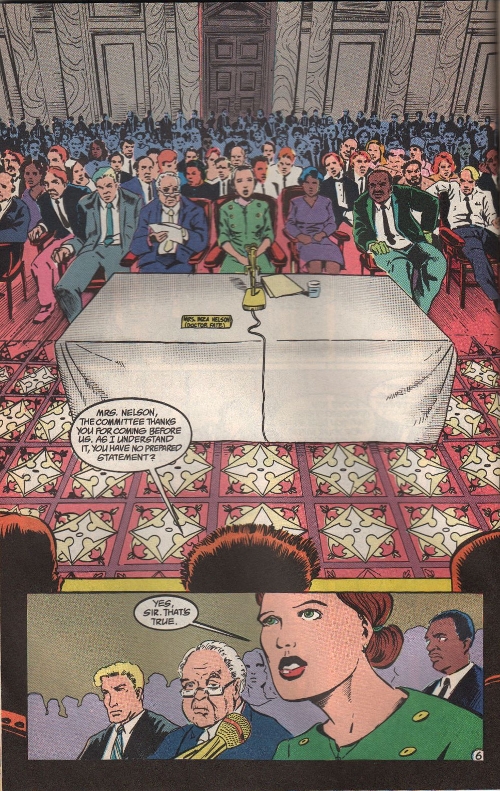
Although the authors make it very clear that Doctor Fate has the power
to affect serious social and political change, they stay very carefully
away from having her do anything that would drastically change the
world we all live in. The reason for this is that for the superhero to
introduce socialism or to abolish war would require changing how the
characters relate to the world. That's not too much of a problem in a
one-time novel, but very difficult in a years-long continuing series.
The problem is also compounded by the integrated nature of superheroes.
The superheroes of today all know each other and interact with each
other in groups like the Avengers
and the Justice
League. If you made drastic social changes in the world of Iron
Man, that would necessarily affects the world of Thor. To then continue
the series after Spider-Man has brought Osama bin Laden to justice or
after making drastic changes to the American economy or if Green
Lantern were to solve the problem of black/white relations would take
either really superior writers or would most likely result in cardboard
cut-out characters who have no conflicts to work on as their every
major, outstanding problem has been solved.
Yes, I agree, superhero comics are essentially conservative in the way
that they generally follow
social and political change, but I don't believe that they inherently
favor either Democrats or Republicans.
Update:
Here are two story snippets which show what can be done successfully
using political subjects in the comics.
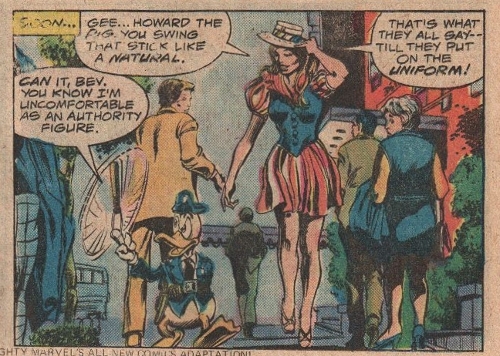
Howard the Duck and his shapely companion Beverly Switzler take part in
a politcal convention in 1976.
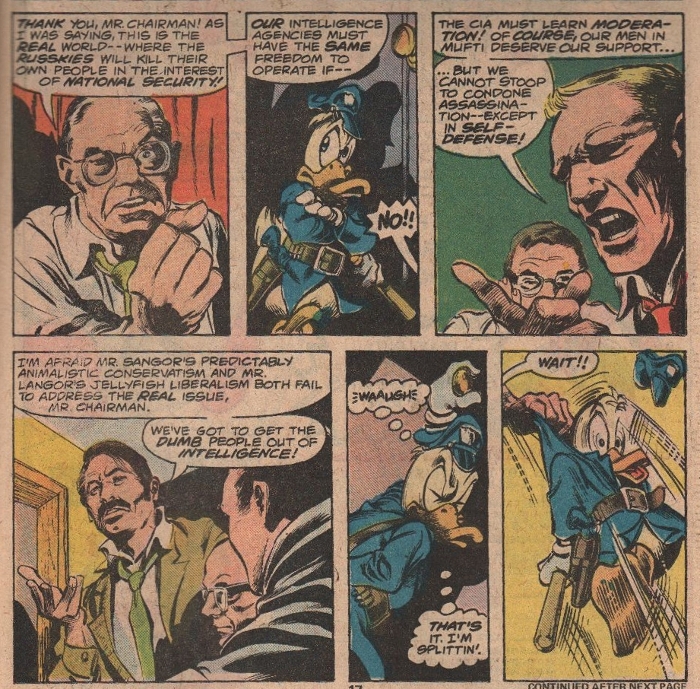
--------------
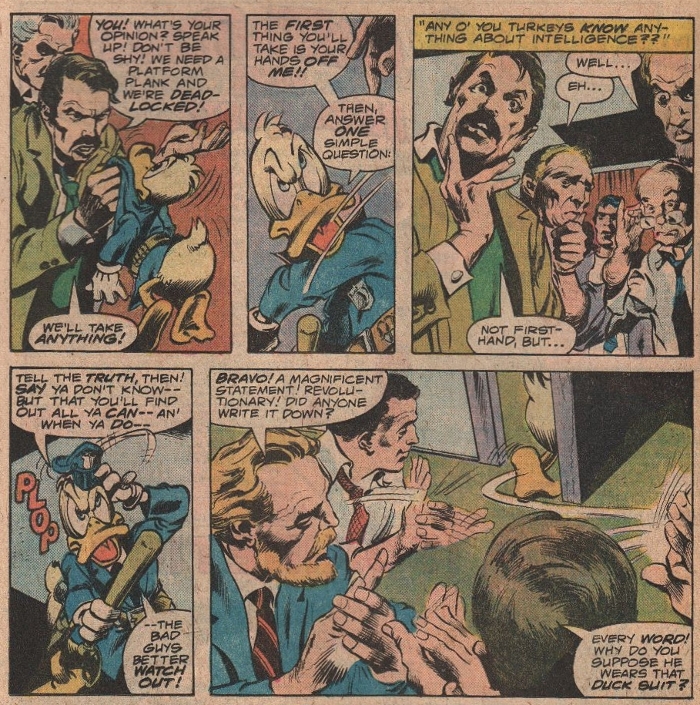
Howard comes in on a debate between political operatives and succeeds
in bowling everyone over by being the reasonable, plain-talking guy who
wants to take a straightforward approach to solving the problems of the
day. The operatives are so deeply into their discourse, they can't
recognize the absurdity of what they're saying. It's a bit dated, but
because it's kept at the level of broad satire, it works. (More on Howard and Beverly)
Here's a scene from The Eternals, written a year later:

------
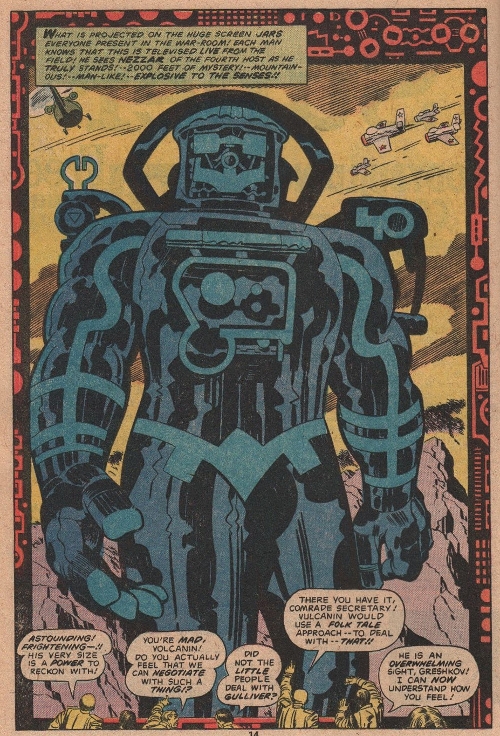
-----

This scene is also a bit dated because the Soviet Union no longer
exists, but the two main characters, Greshkov and Vulcanin, are written
in quick, broad strokes that make identification with both characters
very quick and easy. The second panel of the third page shows the two
of them behaving in what is obviously highly characteristic behavior
for both of them. Vulcanin waves his arms about and shouts, looking
directly at his opponent, Greshkov ponders, smokes his pipe and looks
at the ceiling. The scene works because we can immediately recognize
both character types in the people that we've dealt with in real
life.
2nd update:
Yeah, it sure is funny what upsets the right wing. The Punisher (I've
read comics where he is featured along with other characters, but have
never felt motivated to buy any Punisher comics as the character and
his stories never struck me as interesting) performs the following deeds:
Eviscerations (i.e. disembowlements), cannibalism, rapes, immolations
(i.e. setting people on fire), close-ups of violent shootings, death by
snakes, piranhas, sharks, polar bears (the scene in which the polar bear
swipes the man’s head clean off was simply incredible), beheadings, the
destruction of an entire island by a nuclear bomb, a tossing of a
gangster from the top of the Empire State building (in the full view of a
young teenager who got super excited over it), testicular castrations .
. .
Does any of this provoke the right wing into condemning the Punisher? Nah, they've never even noticed his existence. Do any comics characters get them upset? As a matter of fact, yes.
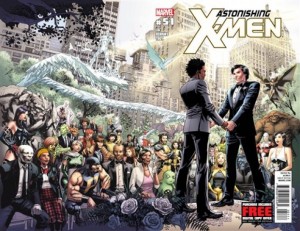
The marriage of Northstar and his boyfriend drives right-wingers
absolutely bonkers! And yes, I have to say, I was most peeved by the
following statement:
“It’s kind of activist comic books, which we don’t need. Comic books
are for entertainment; they’re not for activism, social activism,”
Stanton contends.
Obviously, I beg to differ!
3rd - Women & equality:
From X-Men 63 in 1969, Marvel Girl-Jean Grey makes it clear that she doesn't enjoy being treated as a third wheel in a fight.

In the next scene, Ms. Grey has to think quickly when all of the men
are put out of commission by a Siren, someone who sings the men into
submission.
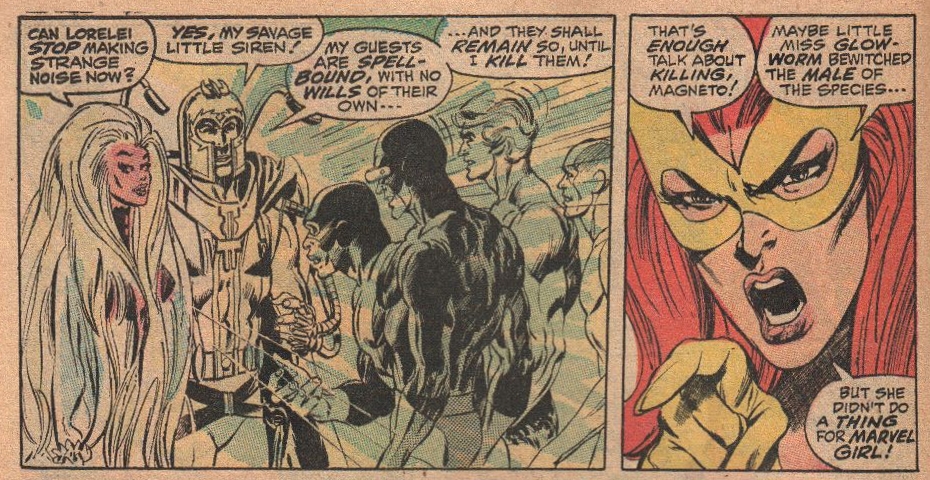
Marvel Girl prevails in the end, but I noticed that she earlier (issue
60) kind of undercuts the strong feminist position she takes here. And
no, I don't think the authors were at all aware of the problem they
created just a few issues earlier.
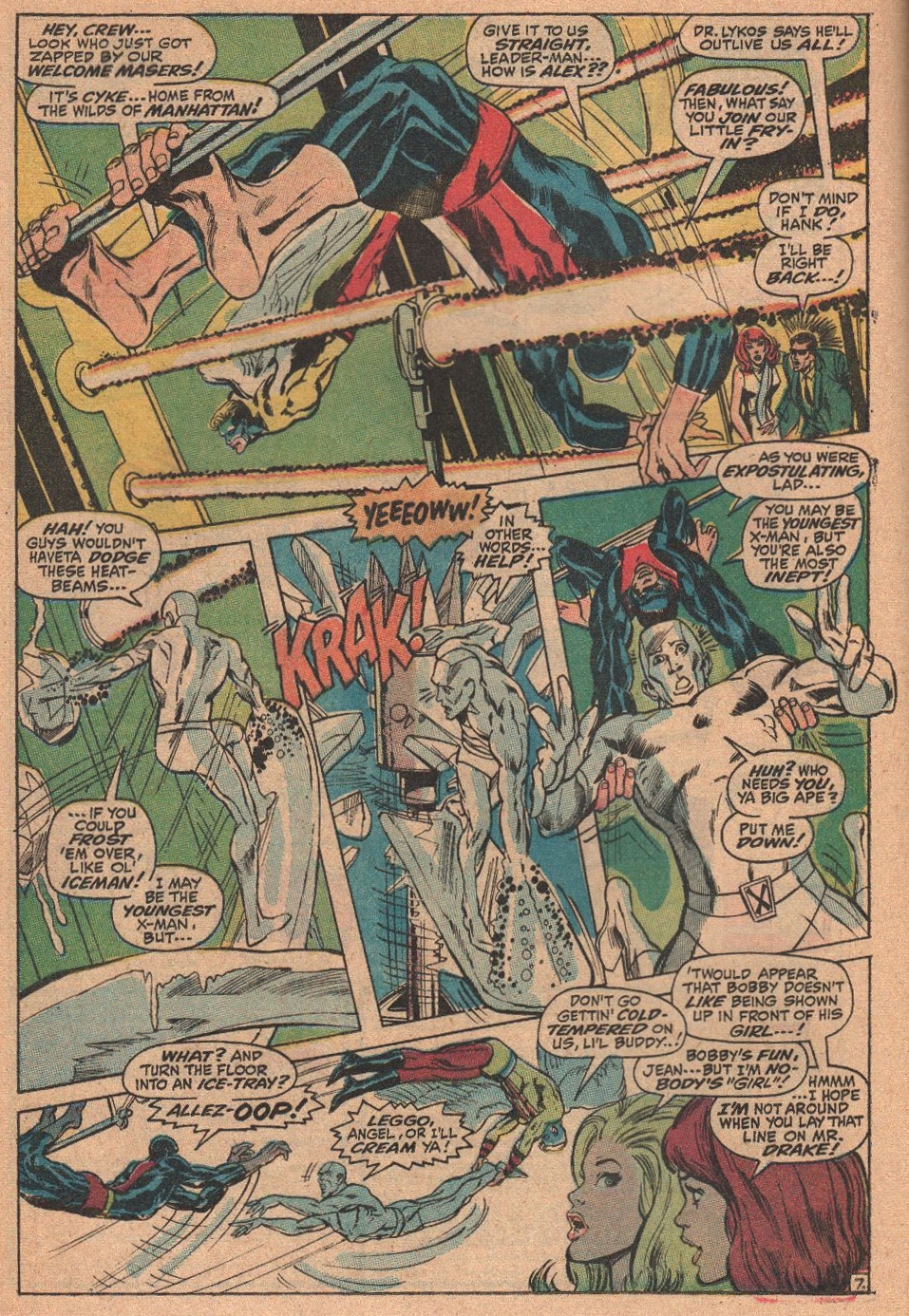

Scott Summers-Cyclops in invited to join in on the roughhousing, but
Jean isn't and she doesn't appear to mind. Granted, her powers are
those of telekinesis, so she doesn't take part in physical stuff
directly, but the her standing aside and allowing "the boys" to do
"their" thing makes it not terribly surprising that they don't consider
her a true, integral part of the team when they're all in a situation
involving actual fighting.
At first, I thought this point was too obvious to be worth addressing, but as we can see, President Obama conducts a "boy's club" when it comes to off-hours sports.
The importance of role models. Ugh, yes, role models. The message my
daughter got from point-guard [Sarah] Palin was: My possibilities include the
chance of running the world. And here’s the message all our daughters
are getting from watching Obama play hoops with the guys: It’s still a
man’s world. You might get chosen for the Cabinet (25 percent of Obama’s
Cabinet picks are women) or as one of the czars (though fewer than 10
percent are women). But even if you sit at the table, you’ll still be
an Obama outsider if you can’t dunk the ball.
Despite Obama’s attempted dismissal of the sexism charge as "bunk,"
his own actions show that he knows the power of behind-the-scenes
bonding. As a freshman state senator back in Illinois, Obama helped form
a weekly poker game in Springfield, and not just for the fun of it.
According to a February ’08 New Yorker story: "And,
like Teddy Roosevelt and Lyndon Johnson, Senator Obama seems to have
played the game at least partly because it enabled him to form political
alliances that he might not otherwise have formed." Or as the president
himself told the AP six months earlier: "In Springfield, it was a way
to get to know other senators, including Republicans."
So why, Mr. President, do you assume that women do not need these
political alliances? Is it that the White House is a man’s world (a
question that yesterday’s New York Times explored on page one)? Or is it
simply that you are uncomfortable around women?
So yes, it's important for Jean Grey and other superheroines to get in
there and start roughhousing or at least playing poker along with the
guys.
Update 4 - Women & Equality II:
A decade later, we see that women superheroes had made a good deal of progress.
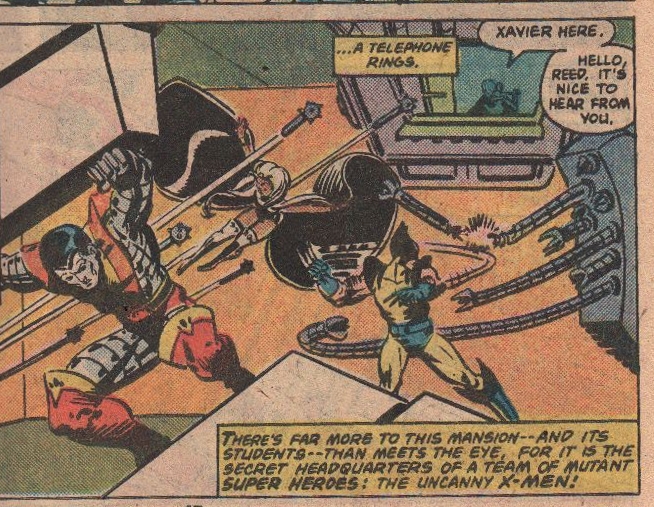
We see X-Men in the Danger Room again (Marvel Team-Up 100), but this time, Ororo-Storm is interacting with the men,
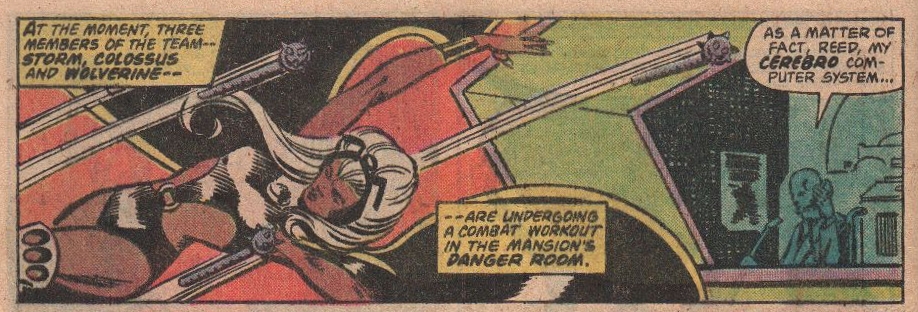 dodging little missiles, perfecting her flying abilities by engaging in really tight manuevers. (More fun with the Danger Room as I look at how a comic and a TV show handle dialogues so as to keep the dialogues visually interesting.)
dodging little missiles, perfecting her flying abilities by engaging in really tight manuevers. (More fun with the Danger Room as I look at how a comic and a TV show handle dialogues so as to keep the dialogues visually interesting.)
Here's Carol Danvers-Ms. Marvel in Marvel Two-in-One 51 about to play poker with the men.
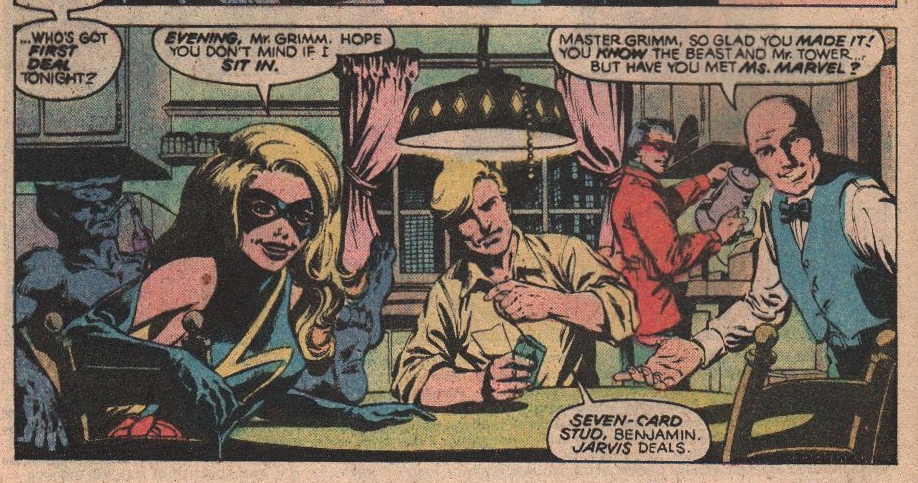
Now, one might reasonably ask "Why is Ms. Marvel wearing a mask for an informal, late-hours, casual get-together?"
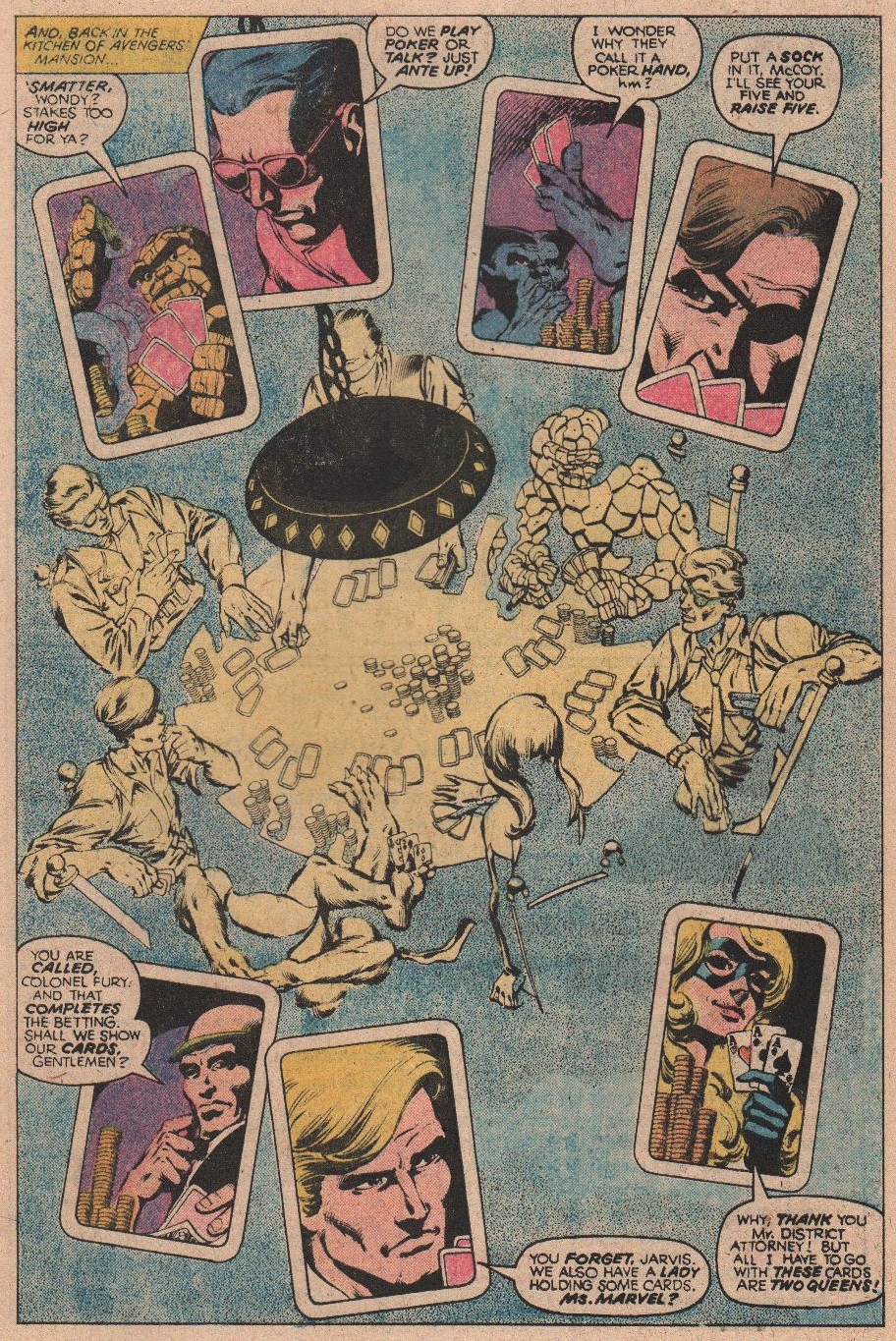
Good question. Going clockwise from the bottom, we have D.A. Tower;
Jarvis, butler to the Avengers; Ben Grimm-The Thing; Simon
Williams-Wonder Man; Hank McCoy-The Beast and Nick Fury, Director of
SHIELD. Out of all of them, Danvers is the only one whose regular
identity is not publicly known.
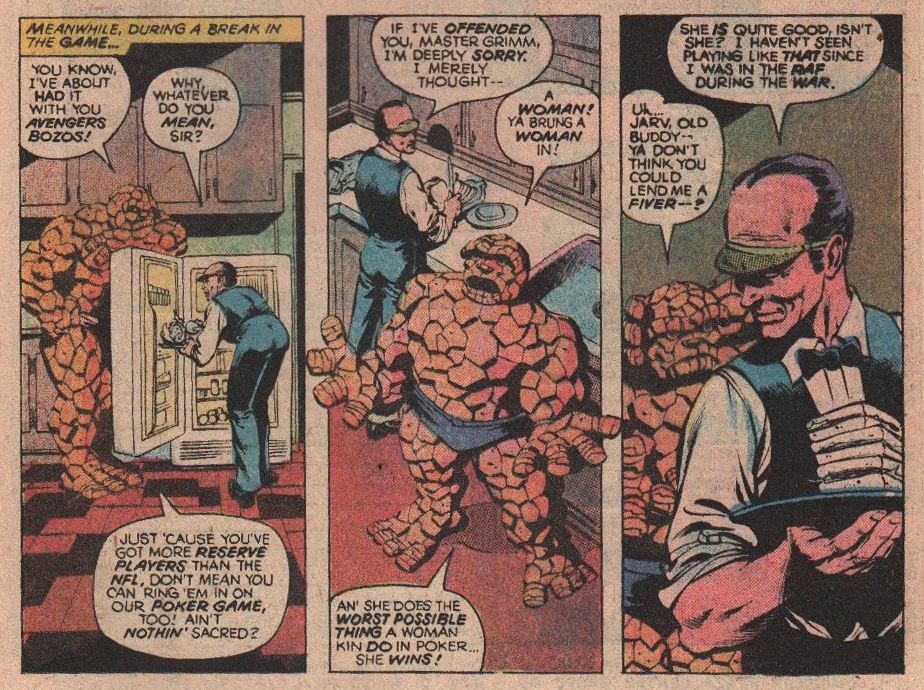
Grimm gripes and grumbles and makes it clear that not only is he
prejudiced against women, he's not all that good a poker player.
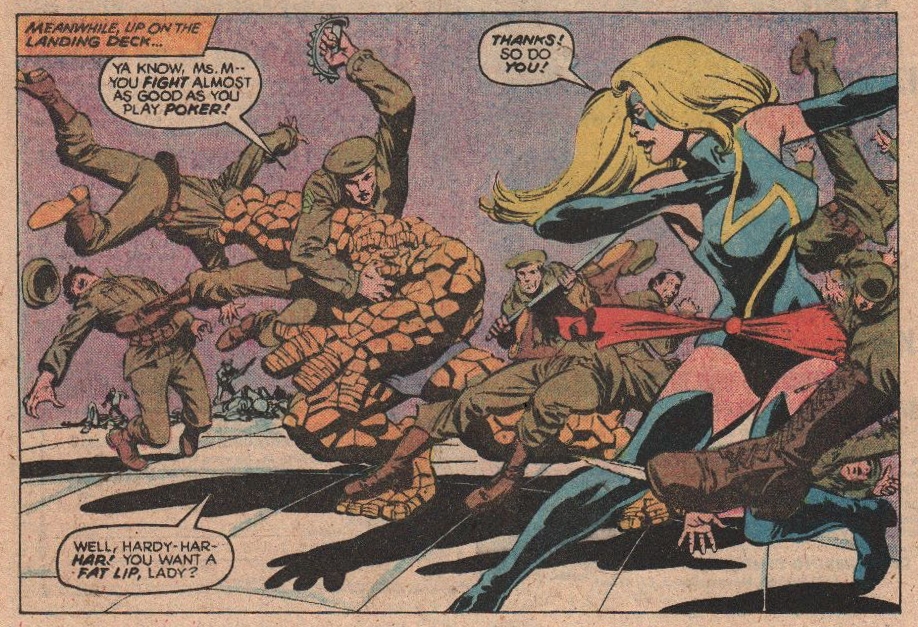
But Grimm gets over it. Here, Danvers shows that while schmoozing with
the other team members is certainly a good thing all by itself, it's
performance out in the field that truly determines whether you're
considered a real team member or not.
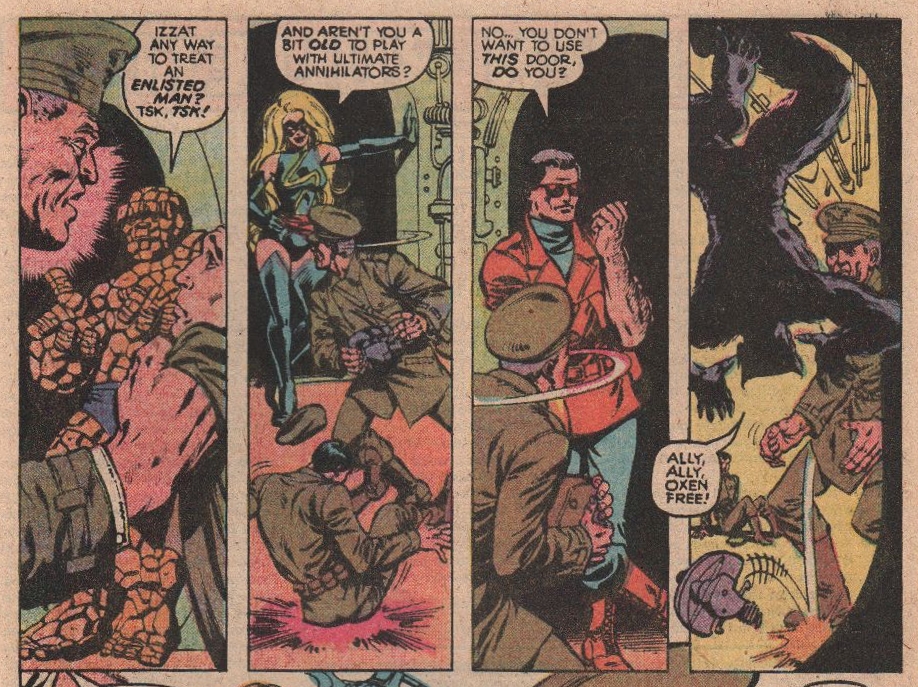
The leader of the bad guys finds himself surrounded and we can see by
where Danvers is placed that she has truly passed all tests and she's
now considered to be a tested, proven and reliable member of the team.
Update 5 - Bronze Age
I was scanning an issue of the Micronauts
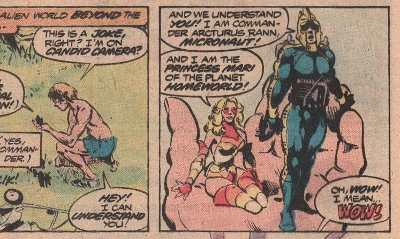
when I did some research on it and saw that the source I looked at
referred to the series as an example of a "Bronze Age comic." I wasn't
familiar with the term and researched it and whattaya know? The term
covers pretty much the period I cover in this essay (And pretty much
all the issues I've scanned). Wikipedia describes the Bronze Age as being from 1970 to 1985 (Marvel Comics refers to it as being just from 1970 to 1979) and the Wikipedia description strike me as pretty accurate:
There is no one single event that can be said to herald the beginning of
the Bronze Age. Instead a number of events at the beginning of the
1970s, taken together, can be seen as a shift away from the tone of
comics in the previous decade.
...
A concern with social issues had been a part of comic book stories since
their beginnings: early Superman stories, for example, dealt with
issues such as child abuse and working conditions for
minors.
However, in the 1970s relevance became not only a feature of the
stories, but something that the books loudly proclaimed on their covers
to promote sales.
Filmgeeks adds:
In the Bronze Age (1970s and 80s),
comics got real with darker story lines, shady elements—clearly not
just for kids anymore. Realism and relevance invaded the comic world as
heroes fought less against aliens and more against drugs, racism, and
death. More and more titles were dealing with real world issues instead
of just caped adventurers battling beings from other galaxies.
Here's a gallery of covers from the time period (I purchased about half of the comics featured here).
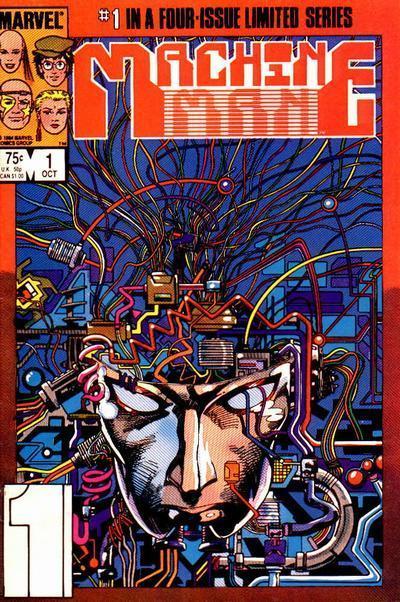
A neat example from 1984. A robot who teams up with a group of humans in the future.
And hey, here's a blog covering well-known issues from the era.
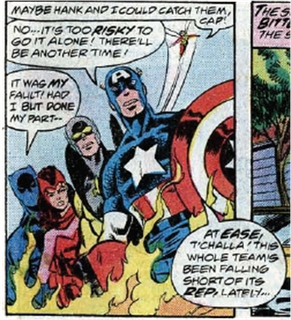
From a post where Avengers 164 is reviewed. This is definitely one of the best team stories of all time.
Home


















 dodging little missiles, perfecting her flying abilities by engaging in really tight manuevers. (More fun with the Danger Room as I look at how a comic and a TV show handle dialogues so as to keep the dialogues visually interesting.)
dodging little missiles, perfecting her flying abilities by engaging in really tight manuevers. (More fun with the Danger Room as I look at how a comic and a TV show handle dialogues so as to keep the dialogues visually interesting.)






